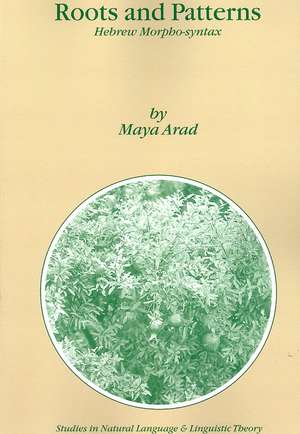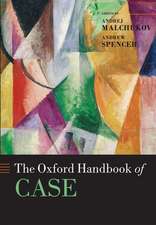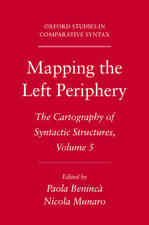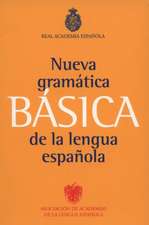Roots and Patterns: Hebrew Morpho-syntax: Studies in Natural Language and Linguistic Theory, cartea 63
Autor Maya Araden Limba Engleză Paperback – 15 iul 2005
The book focuses on Hebrew, a language with rich verb morphology, where both roots and noun- and verb-creating morphology are morphologically transparent. The study of Hebrew verbs is based on a corpus of all Hebrew verb-creating roots, offering, for the first time, a survey of the full array of morpho-syntactic forms seen in the Hebrew verb.
While the focus of this study is on how roots function in word-formation, a central chapter studies the information encoded by the Hebrew root, arguing for a special kind of open-ended value, bounded within the classes of meaning analyzed by lexical semanticists.
Toate formatele și edițiile
| Toate formatele și edițiile | Preț | Express |
|---|---|---|
| Paperback (1) | 640.37 lei 6-8 săpt. | |
| SPRINGER NETHERLANDS – 15 iul 2005 | 640.37 lei 6-8 săpt. | |
| Hardback (1) | 646.94 lei 6-8 săpt. | |
| SPRINGER NETHERLANDS – 15 iul 2005 | 646.94 lei 6-8 săpt. |
Din seria Studies in Natural Language and Linguistic Theory
- 24%
 Preț: 808.03 lei
Preț: 808.03 lei - 18%
 Preț: 788.72 lei
Preț: 788.72 lei - 18%
 Preț: 958.56 lei
Preț: 958.56 lei - 15%
 Preț: 600.26 lei
Preț: 600.26 lei - 18%
 Preț: 947.67 lei
Preț: 947.67 lei - 15%
 Preț: 646.62 lei
Preț: 646.62 lei - 18%
 Preț: 723.56 lei
Preț: 723.56 lei - 15%
 Preț: 604.84 lei
Preț: 604.84 lei - 18%
 Preț: 952.09 lei
Preț: 952.09 lei - 15%
 Preț: 642.51 lei
Preț: 642.51 lei - 18%
 Preț: 947.50 lei
Preț: 947.50 lei - 15%
 Preț: 646.75 lei
Preț: 646.75 lei - 18%
 Preț: 1224.54 lei
Preț: 1224.54 lei - 15%
 Preț: 641.71 lei
Preț: 641.71 lei - 18%
 Preț: 2314.56 lei
Preț: 2314.56 lei - 18%
 Preț: 952.89 lei
Preț: 952.89 lei - 18%
 Preț: 1220.12 lei
Preț: 1220.12 lei - 15%
 Preț: 642.83 lei
Preț: 642.83 lei - 18%
 Preț: 944.19 lei
Preț: 944.19 lei - 15%
 Preț: 648.05 lei
Preț: 648.05 lei - 18%
 Preț: 952.57 lei
Preț: 952.57 lei - 18%
 Preț: 1729.61 lei
Preț: 1729.61 lei - 15%
 Preț: 644.95 lei
Preț: 644.95 lei - 15%
 Preț: 644.63 lei
Preț: 644.63 lei -
 Preț: 384.48 lei
Preț: 384.48 lei - 18%
 Preț: 1662.85 lei
Preț: 1662.85 lei - 18%
 Preț: 955.08 lei
Preț: 955.08 lei - 18%
 Preț: 952.40 lei
Preț: 952.40 lei -
 Preț: 386.81 lei
Preț: 386.81 lei
Preț: 640.37 lei
Preț vechi: 753.39 lei
-15% Nou
Puncte Express: 961
Preț estimativ în valută:
122.53€ • 128.28$ • 101.39£
122.53€ • 128.28$ • 101.39£
Carte tipărită la comandă
Livrare economică 07-21 aprilie
Preluare comenzi: 021 569.72.76
Specificații
ISBN-13: 9781402032455
ISBN-10: 1402032455
Pagini: 296
Ilustrații: VIII, 286 p.
Dimensiuni: 160 x 240 x 16 mm
Greutate: 0.42 kg
Ediția:2005
Editura: SPRINGER NETHERLANDS
Colecția Springer
Seria Studies in Natural Language and Linguistic Theory
Locul publicării:Dordrecht, Netherlands
ISBN-10: 1402032455
Pagini: 296
Ilustrații: VIII, 286 p.
Dimensiuni: 160 x 240 x 16 mm
Greutate: 0.42 kg
Ediția:2005
Editura: SPRINGER NETHERLANDS
Colecția Springer
Seria Studies in Natural Language and Linguistic Theory
Locul publicării:Dordrecht, Netherlands
Public țintă
ResearchCuprins
Roots: Where Syntax, Morphology, and the Lexicon Meet.- The Noun-Verb Asymmetry in Hebrew: When Are Patterns Obligatory?.- The Contents of the Root: Multiple Contextualized Meaning in Hebrew.- The Morphological Consequences of MCM: An Intermediate Summary.- Roots Across Patterns in Hebrew.- A Theory of Hebrew Verbal Morpho-Syntax.- Roots in Word-Formation: The Root Hypothesis Revisited.
Textul de pe ultima copertă
This book is simultaneously a theoretical study in morphosyntax and an in-depth empirical study of Hebrew. Based on Hebrew data, the book defends the status of the root as a lexical and phonological unit and argues that roots, rather than verbs or nouns, are the primitives of word formation. A central claim made throughout the book is the role of locality in word formation, teasing apart word formation from roots and word formation from existing words syntactically, semantically and phonologically.
The book focuses on Hebrew, a language with rich verb morphology, where both roots and noun- and verb-creating morphology are morphologically transparent. The study of Hebrew verbs is based on a corpus of all Hebrew verb-creating roots, offering, for the first time, a survey of the full array of morpho-syntactic forms seen in the Hebrew verb.
While the focus of this study is on how roots function in word-formation, a central chapter studies the information encoded by the Hebrew root, arguing for a special kind of open-ended value, bounded within the classes of meaning analyzed by lexical semanticists.
The book is of wide interest to students of many branches of linguistics, including morphology, syntax and lexical semantics, as well as of to students Semitic languages.
The book focuses on Hebrew, a language with rich verb morphology, where both roots and noun- and verb-creating morphology are morphologically transparent. The study of Hebrew verbs is based on a corpus of all Hebrew verb-creating roots, offering, for the first time, a survey of the full array of morpho-syntactic forms seen in the Hebrew verb.
While the focus of this study is on how roots function in word-formation, a central chapter studies the information encoded by the Hebrew root, arguing for a special kind of open-ended value, bounded within the classes of meaning analyzed by lexical semanticists.
The book is of wide interest to students of many branches of linguistics, including morphology, syntax and lexical semantics, as well as of to students Semitic languages.










